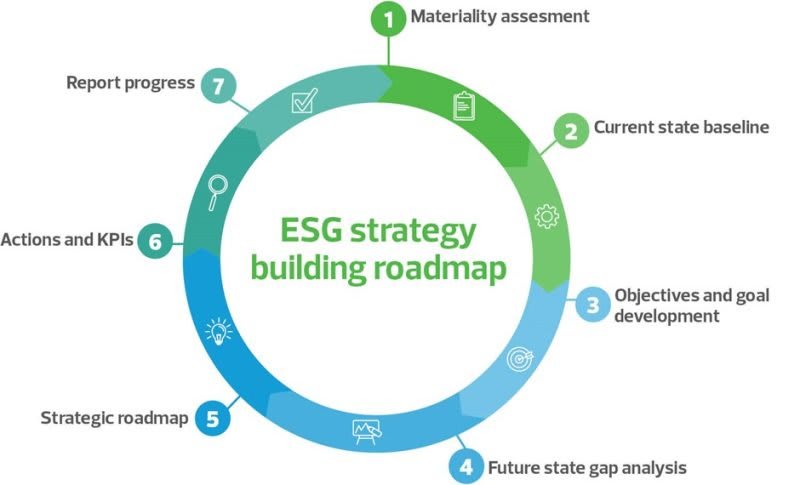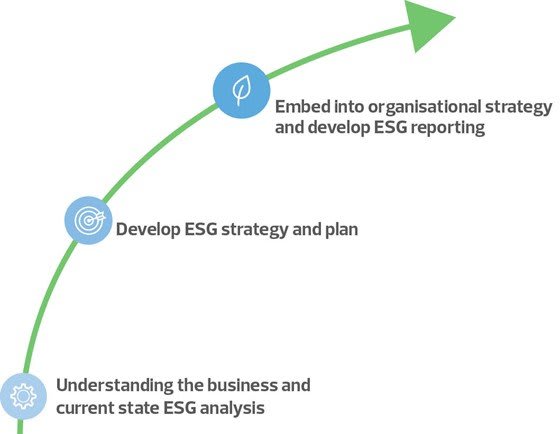As a start-up, you may have heard of ‘ESG’ (environmental, social and governance) and wondered: With all I’ve got going on, how could I possibly worry about that too?
But the truth is, being a start-up actually puts you in a prime position to make ESG a competitive advantage (as well as being a good corporate citizen).
As the opposite of a large firm with deeply embedded business practices, your agility is a key advantage. The benefits of leveraging that agility could be greater than you imagine.
Let’s demonstrate this point – a 2022 study by Capital Group found 89% of investors consider ESG issues in some form as part of their investment approach. A Stanford University study identified that younger investors are more willing to put money behind environmental and social goals — even if it costs them more.
In addition to investor attraction and capital raising, focused attention to ESG outcomes delivers a host of other benefits as shown below:
![]() Consumer interest and loyalty – A 2022 study by Finder discovered 1 in 2 Australians actively look for greener products and services. Another consumer study found 9 in 10 Australians were more likely to purchase ethical and sustainable products.
Consumer interest and loyalty – A 2022 study by Finder discovered 1 in 2 Australians actively look for greener products and services. Another consumer study found 9 in 10 Australians were more likely to purchase ethical and sustainable products.
Staff attraction – A 2022 study by IBM found 67% of participants were more willing to apply for a job (and 68% were more willing to accept a job) with an environmentally sustainable company.
Positive impacts on environment and community – There’s something special about doing good for the environment and the communities you operate in. ![]() The best part about ESG is that it allows you to tangibly measure that positive impact so you can quantify the good you’re doing.
The best part about ESG is that it allows you to tangibly measure that positive impact so you can quantify the good you’re doing.
Sustainable business – Caring about ESG doesn’t just add value to the environment and community, it makes your business more sustainable too. This includes real business impacts like lower energy costs, more efficient use of resources and greater readiness for future ESG-related regulations in the future.
Developing an ESG statement
To begin your ESG journey, you will want to develop an ESG statement. This should be guided by an underlying ESG strategy. Your ESG statement should be clear and realistic with no ‘greenwashing’ (marketing spin with deceptive statements about green policies and practices).
The ESG statement is your ‘voice to the world’. Because the range of subject matters is broad, it can be helpful to use a recognised sustainability framework such as GRI (Global Reporting Initiative) or SASB (Sustainability Accounting Standards Board). The upcoming ISSB (International Sustainability Standards Board) standards will also provide useful guidance.
Once you have selected a framework, you should consider the:
- Material sustainability impacts your business has on the community and environment
- Actions you intend to take (which links to your ESG strategy)
- Measures you’ll use to track progress and report to stakeholders
- Systems you will use to create and capture this data (it’s unlikely you will be capturing all of it right now)
This statement tells your “ESG story”. It concisely describes your commitment to investors and other stakeholders, while helping you stand out among competitors and giving your business specific goals to work towards.

Turning your ESG statement into action
To put your statement into action, you need to break it down into simple steps you can take now and in the medium and long term – don’t ‘promise the world’ over the next financial reporting period.
You’ll also need to decide how you will capture data to prove your efforts are actually having an impact. For example, if your goal is to be carbon neutral then you need to know:
- What is our carbon footprint now?
- What can we do to reduce it?
- How can we offset what we can’t reduce?
- What skills/support do we need to achieve carbon neutrality?
The same applies to goals around water usage or recycling. You first need to measure your current state, then set a target and develop strategies to achieve it.
How you go about measuring your current state depends on the way your business operates. It could include elements such as energy bills, use of renewable energy through your provider, fuel use, flights, recycling practices and so on.
If you run a product-based business, you could evaluate the embedded carbon in your raw materials, the amount of energy it takes to produce the product, and the way it is packaged and shipped. In terms of social impact, you may decide (for example) to only source products from vendors in jurisdictions with a positive ESG or corporate governance index score.
Being a young company, you may need to implement software over time that measures and tracks your progress with sustainability initiatives. In the early days of your start-up, it may be simpler to have the business track data manually (e.g. in Excel) until the capital is available to make system investments.

Give your start-up the best chance of ESG success
As you start your ESG journey, remember not to make misleading statements or get carried away with ‘pie in the sky’ ideas that could hurt your business – both reputationally and financially.
Instead, commit to taking an active interest in ESG and developing sound and achievable strategies. Nominate someone to be responsible and accountable for making these strategies a reality and monitoring progress.
If you need support, an ESG consultant can be a great source of guidance. They can help you understand your ESG current state, and work with you to develop achievable immediate and long term goals to give you the best chance of success. If you haven’t yet figured out your ESG strategy, they can facilitate you through the process and provide the foundation for sustainability reporting in future.
FOR MORE INFORMATION
To speak with a skilled ESG consultant about getting started on your ESG journey, contact the Risk Advisory team at RSM on 08 9261 9302.





